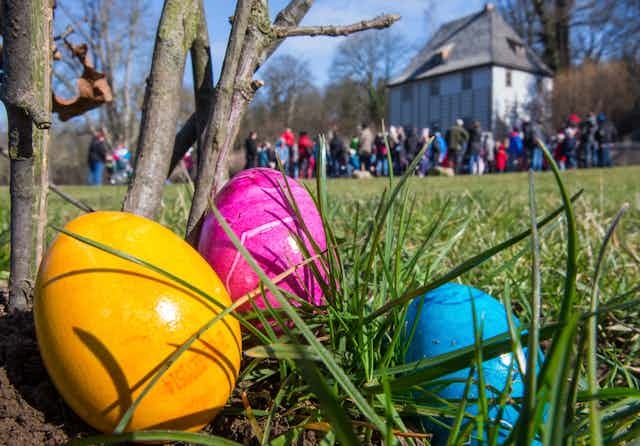Some people have dismissed it as a “storm in an egg cup”, but the controversy over Easter eggs has embroiled quintessentially “English” institutions. And unlike most chocolate eggs currently on sale in shops, the story ultimately has rather more inside it than you might imagine. It touches upon issues of fake news, the contested borderlands of secularism and religiosity, and the fluid interplay of state, church and national identity in Brexit Britain.
It started with an article in The Daily Telegraph. This voice of “small c” conservativism (wrongly) accused Cadbury, a venerable confectioner with nearly 200 years of history, and the National Trust, which looks after many of the UK’s finest stately homes, of dropping references to “Easter” from promotional material for their Easter egg hunts and turning a religious festival into a “chocfest”. The article quoted a spokesman for the Church of England saying: “This marketing campaign … highlights the folly in airbrushing faith from Easter.”
The events gained momentum with an accusation by the Archbishop of York, John Sentamu, the second most senior clerical position in the Church of England, that this amounted to “spitting on the grave” of Cadbury’s founder. One of his descendants would later claim that, as a Quaker, John Cadbury didn’t actually celebrate Easter – but the archbishop’s vivid condemnation had made its mark.
The the UK’s prime minister, Theresa May, who less than a week after triggering Article 50 might have bigger issues to face, declared that:
The stance they [Cadbury and the National Trust] have taken is absolutely ridiculous. I don’t know what they are thinking about frankly. Easter’s very important. It’s important to me.
Predictably, a range of politicians weighed in on the topic, with Nigel Farage declaring that this was part of a battle for Britain’s very soul:
There are a variety of curious features to the story, the first of which is that its central premise, that Cadbury and the National Trust airbrushed out references to Easter, is actually pretty weak. Numerous media commentaries spotted that the word “Easter” is sprinkled liberally across both organisations’ websites. Indeed, if they really were trying to expunge mentions of the Christian festival from their material, they were doing a pretty dire job of it. In the rapid fire age of social media anger and freely-given accusations of “fake news”, this whole affair may seem like a prime candidate for dismissal as a confected nonsense.
Defending the faith
But the controversy intersects with several deep and longstanding tensions. One of these is the question of what is actually meant when Christianity is discussed in England. As several pundits have observed, the religious roots of many Easter traditions are decidedly hazy and, in truth, the precise divisions between pagan inheritance, Christian practice and secular appropriation are all difficult to pin down.
One doesn’t have to spend long pondering the vast disconnect between the number of people who self-identified as Christian in the last census and the number of people who actually go to church to appreciate that religious and secular identities are decidedly fluid.
The Archbishop of York may see the advertising of a chocolate egg hunt as a frontline against secularism to be fought over with passion but, in reality, British society is instead full of tiny and opaque daily skirmishes in which religious language and tradition is expressed or sidelined at varying conscious and unconscious levels.
Dog-whistling
But what is clear is that for some political figures an appeal to visions of Christianity under siege is more irresistible than any chocolate. This is because “Christianity under siege” can become profoundly bound up in ideas of “Britishness under siege”. Nigel Farage’s declaration that “we must defend our Judeo-Christian culture and that means Easter” is of course an obvious case.
Leaving aside the casual alignment of the “Judeo-Christian” with what is, in effect, simply Christian, the intervention maps neatly onto a longstanding UKIP policy of positioning themselves as the defenders of Christian values (see, for instance, their “Valuing Our Christian Heritage” campaign during the 2015 general election).

But Conservative politicians have found fertile ground here, too. In his 2016 Easter address, David Cameron reflected that “we are a Christian country and we are proud of it”, building on a longstanding rhetorical alignment of “Christian values” and “British values”. Given Theresa May’s history of fiercely asserting the importance of “British values”, her firm defence of British Christians who feel marginalised and her mission, in triggering Article 50, to “restore, as we see it, our national self-determination”, the scene is set for a drama in which actors seen to undermine Christian identity are cast as villains of the piece.
The misfortune for the National Trust and Cadbury (which is now owned by US giant Kraft) was to walk onto the stage at the wrong time – and no doubt they won’t be the last to do so. That the evidence of their misconduct is shaky and the crime’s very theological and sociological coherence is questionable are, in effect, minor details within the greater rhetorical purpose.
The Church of England’s role is more complex, however. The institution has on occasions voiced public unease at the nationalistic and exclusionary potentials of extolling “British values”, and last year’s row between Farage and Archbishop of Canterbury Justin Welby made it plain that UKIP and the Church of England’s understandings of “Christian heritage” are far from harmonised.
But as the egg controversy shows, undercooked and hyperbolic church interventions against organisations deemed to undermine Christian tradition may, intentionally or not, ultimately end up providing a feast for nationalists.

